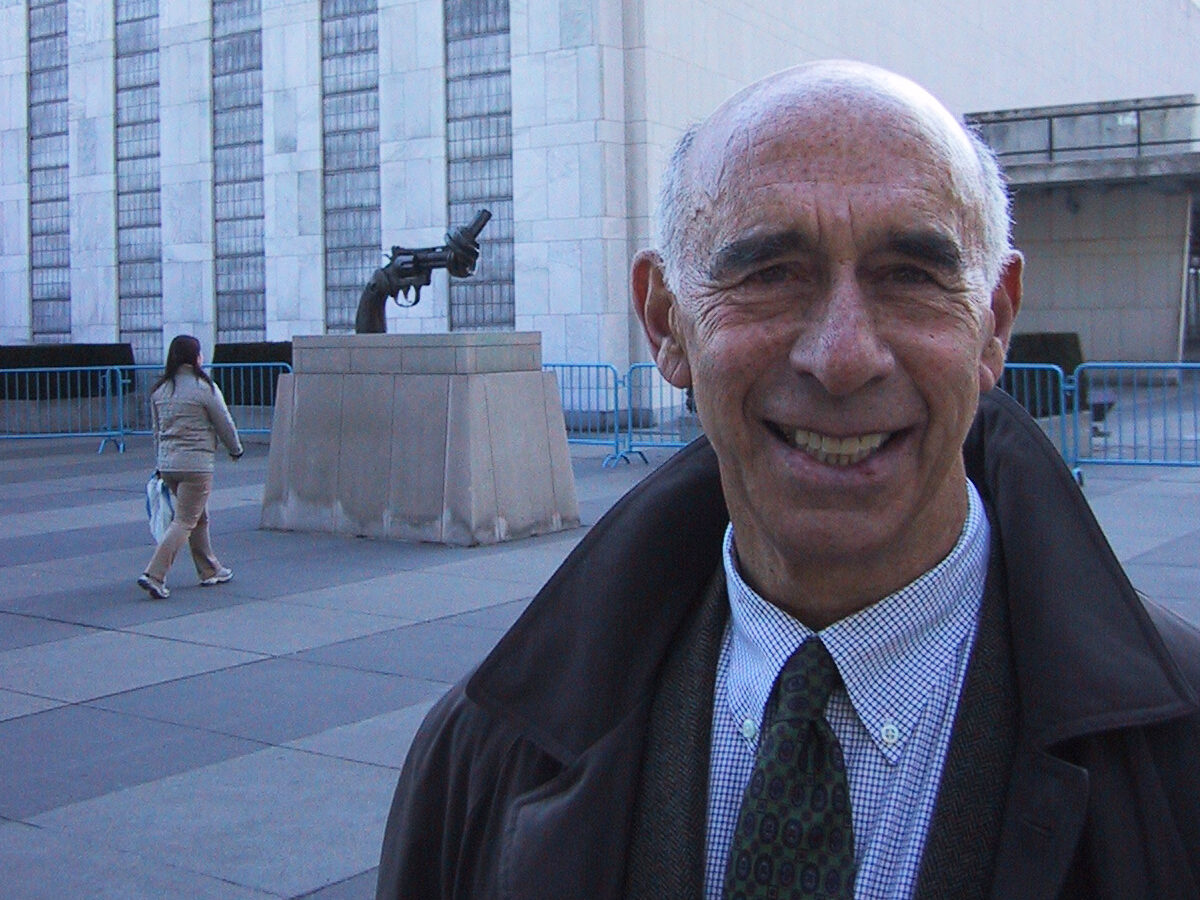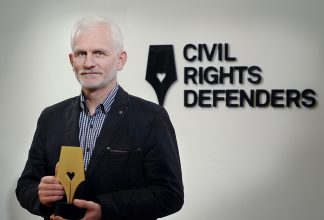We remember Gerald Nagler

Gerald Nagler, prominent human rights activist, founder of Civil Rights Defenders and Secretary General of the International Helsinki Federation of Human Rights from 1982 to 1992, passed away on 23 July 2022, aged 92.
Gerald Nagler, with his energetic civil courage and optimism, has for over 40 years been a crucial force in promoting human rights in Sweden and internationally. He was instrumental in putting the spotlight on the human rights violations that took place in the Soviet Union and in Eastern Europe during the 1980s. During the wars of the 1990s in the Western Balkans, he supported the establishment of many human rights organisations and free media. When Gerald Nagler started the Swedish Helsinki Committee for Human Rights in 1982, he laid the foundation for what is today the large global human rights organisation Civil Rights Defenders.
Gerald Nagler has until his death been of enormous importance to, as well as very active in, the work for human rights. He now leaves a huge void behind him.
Gerald Nagler grew up in the shadow of World War II. As a child, he was presented with eyewitness accounts of the Holocaust and the Nazi atrocities when the family received refugees in their home. It was one of several decisive factors when he later in life decided to give up his 25-year career in business and instead dedicate his life to the fight for human rights. In August 1975, the Helsinki Declaration was signed by 35 countries, including the Soviet Union, to guarantee security and cooperation after World War II. The final text explicitly states that respect for human rights is a prerequisite for peace and friendly relations between states.
Gerald Nagler has told us that he was strongly influenced by the speech given by Soviet dissident Andrei Sakharov, upon receiving the Nobel Peace Prize. In his acceptance speech, delivered by the imprisoned Sakharov’s wife, he called on the whole world to join forces and start independent human rights organizations.
The year after the Helsinki Conference, the Moscow Helsinki Group was formed which, backed by the Helsinki Declaration, began reporting on the Soviet Union’s human rights violations. Gerald Nagler traveled to the Soviet Union to meet with Russian human rights activists and dissidents, including Andrei Sakharov, Yelena Bonner and the other 12 founders of the Moscow Helsinki Group. These meetings became crucial to Gerald Nagler’s commitment to human rights.
The members of the Moscow Helsinki Group were persecuted, imprisoned and sent into exile. But the initiative spread. In the years that followed, national Helsinki committees were formed in most of the Warsaw Pact countries. Poland’s human rights defenders gathered in what later came to be known as Solidarity and in Czechoslovakia the well-known Charter 77 was formed. In addition, more and more Helsinki committees were founded in the West.
In 1982, Gerald Nagler founded the Swedish Helsinki Committee for Human Rights at home in his kitchen on Lidingö in Stockholm, together with his wife Monica.
The main objective was to support human rights defenders at risk in the Soviet Union and other Eastern Bloc countries, to draw attention to their persecution, demand the release of those imprisoned and to demand respect for their rights. The work was supported by a hundred Swedish famous politicians, academics and cultural personalities. Gerald Nagler has told us:
“We had no budget, no staff and no office, but we had a mission.”
In the same year, Gerald co-founded the International Helsinki Federation, an umbrella organisation with the aim of coordinating public opinion work and supporting cooperation between the East and West Helsinki committees. Gerald Nagler became its first Secretary General.
In order to support persecuted dissidents, many and often risky trips were made to countries behind the Iron Curtain to document and obtain information about the human rights violations that took place and to shine a spotlight on those countries that did not live up to the agreement on respect for human rights in the Helsinki Declaration.
Gerald Nagler has often highlighted his admiration for the unknown and nameless men and women who, without receiving any recognition for their work, risked their lives for freedom, democracy and human rights. He calls them heroes in silence.
Gerald led the International Helsinki Federation until 1992 and the Helsinki family grew to include more than 40 organisations.
Between 1992 and 2004, Gerald was chairman of the Swedish Helsinki Committee, which after the fall of the Berlin Wall gradually shifted focus and working methods. The dissolution of the former Yugoslavia and the subsequent wars in the 1990s led the organisation to start working in the Western Balkans, an initiative that came to be very extensive. State controlled media were used in all the Yugoslav republics as part of the warfare to whip up hatred between the ethnic groups. The work of Gerald’s organisation was primarily focused on supporting the good forces that existed, and on creating conditions for more independent sources of information that could balance the official image conveyed.
During the 2000s, questions about how Sweden lived up to its commitments on human rights became an increasingly important part of the organisation’s work, both regarding secret surveillance and the gross human rights violations that took place in Sweden as a result of the international fight against terrorism. Since 2004, Gerald has continued to take an active part in the organisation’s work, in his role as honorary chairman.
In 2009, the Swedish Helsinki Committee changed its name to Civil Rights Defenders and its activities grew in more regions around the world. Today, Civil Rights Defenders has over 100 employees who support and collaborate with human rights defenders in more than 50 countries.
For several years now, Gerald has also been involved in the legal profession’s commitment to human rights through the establishment of Gerald Nagler Human Rights Traineeship, a one-year trainee position at Civil Rights Defenders aimed at lawyers at the beginning of their professional lives.
Although human rights work is a difficult and risky job, where the measure of success can often be the status quo or that repression does not increase, Gerald has always maintained his optimism. When he started, the concept of human rights had to be explained. Today it is on the agendas of politicians, as well as companies and Gerald’s contribution to this cannot be underestimated. At the same time, the work for a strong civil society that stands up for freedom, democracy and human rights is needed today more than ever and we at Civil Rights Defenders will do everything we can to take Gerald’s fight forward.


